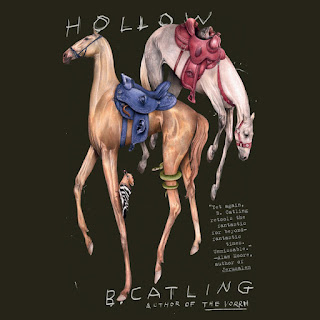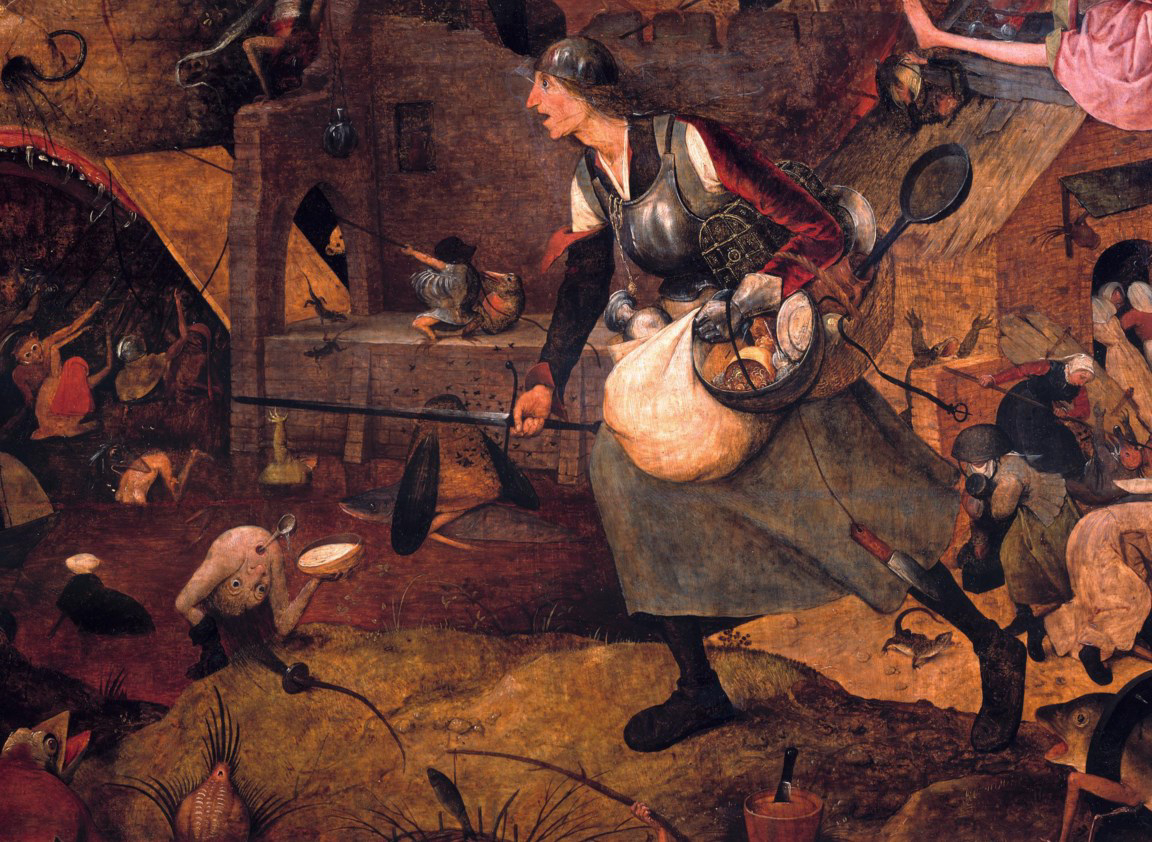I'm going to noodle a lot about language and weird little questions this book inspired, but please don't think that because I do so means this book is not an exciting or eventful read. It is that and more. So much more!
was part of a series. Or at least a grouping of novels set in a shared Dryco Cinematic Universe. And that there are more than a handful of these
books. Yippee!
The first-for-me* of these other books,
Elvissey, is more or less a direct sequel to
RAoSV, which I re-read at the beginning of this year. And, if possible, it packs some even bigger emotional wallops than its predecessor. As in buckle up. But also...
The characters in the Dryco universe speak an argot that is easy to understand if you don't try to do so, but gets more difficult to grasp the more you think about it. It's beyond how Lola Harte, the heroine of
RAoSV, wrote in her diary that formed that novel, but not in the way I had figured it would be; the overlapping characters, Iz and Judy, are all grown up now but instead of speaking something more like the modern American English that we know, betokening the greater sophistication of adulthood in contrast to 12-year-old Lola's schoolgirl prose, Iz, Judy and all their colleagues sound like they come from Pohl and Kornbluth's
Space Merchants world by way of
Darmok's planet, with a lot of corporate jargon and buzzwords thrown in. Nouns are verbed, verbs are nouned, aphorisms are condensed (my favorite phrase: "You're mountaining this molehill" with "an exaltation of interpreters" a close second - in which "interpreters" is used in the sense of those who embody and act rather than render speech from one language into another, as a close second. The "exaltation" is one of Elvis impersonators!), all manner of portmanteaus and inherited malapropisms appear, and some terminology is so opaque as to constitute a mystery at least as compelling as any mechanisms of plot or character. "Regooding," for instance. How creepy and Orwellian is this neologism, really? It's baffling as the story starts, and we're left to soak up its meaning via context.**
This would be maddening and even a reason to DNF a novel if a lesser writer than Jack Womack were the author.
But so, what's Elvis got to do, got to do with it? I'll get to that, but first let's enjoy all the different things this title could mean. Perhaps it is an epic journey undertaken, not by Odysseus but by Elvis? Or maybe "Elvissey" denotes a thing or things associated with Elvis, as we might call, say, Graceland or a Las Vegas wedding chapel an Elvissey (like an abbey)? Though I at least would probably wind up sticking an "R" in there to make the stand-alone noun, as in an "Elvisry." Then again, maybe it's an adjective. Hey, that was Elvissey. How Elvissey? A little Elvissey? A lot Elvissey? The Elvisseyest thing ever? We eventually learn that it is none of these things but a completely legit other, proving that Womack thought about this even more than I did.
See what you've done to my brain this time, Mr. Womack? I hope you happy. Happify?
"All Elvii bewail their lot... Digging oases of pain in deserts of comfort... Such jabbernowling frets and hinders," a character observes early in the story. This little speech is a perfect example of how this argot is both breezily simple and fiendishly complex. Leaving aside what the "Elvii" are for a moment, he's basically rephrasing our contemporary aphorism "some people'd bitch if their water's too wet" (or a yet more contemporary "now and then it's important to stop and bitch about the roses"), and we nod along because ain't that the truth, these Elvii have it great and they're still complaining but then what the hell is "jabbernowling" and is it something that frets, as in performs the act of fretting, or has the argot of Elvissey transformed the simple verb "fret," meaning something like "to fuss or worry about something" into a transitive verb, requiring an object, meaning something like "to cause someone to fuss or worry about something?"
I still haven't parsed what "jabbernowling" is, though I'm pretty sure it has something to do with pointless verbalizing, as in "jabber."
With all this extra musing on language waiting to pounce from every page, Elvissey is a very demanding book for its length and its pulpy plot.
Because oh yeah, the plot. For there is indeed a plot taking place amid all the Fun With Language.
It's even easy to summarize: Iz, Lola's closest girlfriend from the harrowing second half of RAoSV, survived their teenage years as New York City fell apart and has married a wonderful but troubled man and the two of them have been "Regooded" by Dryco (the only corporate overlord you'll ever need, who have taken over most, if not all, of the functions of government, including the enormous project of rehabilitating New York City with an eye toward making it a utopian City of the Future... for a million inhabitants and no more) as a field team the company sends on vitally important but seemingly impossible missions, though ordinarily she is the administrative assistant to DryCo's second-in-command that being Judy) and her husband is a high-level security guard.
In this case, Iz and husband John are to travel back in time/ visit a parallel universe and abduct one Elvis Aaron Presley from when he was at the height of his youth and beauty, and thus his value to Dryco... and bring him back to their post-collapse New New York to be the messiah for a cult that already exists (these are the Elvii mentioned above, so no, there are not multiple Elvises Presley running around. Or are there?).
This poses another interesting question, of course. This novel was originally published in 1993, when Elvis had only been dead for 16 years or so. I remember occasionally encountering people back then who staunchly believed that Elvis was still alive, had faked his death so he could be just another guy in the world who just had to deal with being made by his devotees every once in a while, but who had the whole publicity-industrial complex on his side to keep his secret. His fans who "knew better" were just harmless and amusing kooks, back then, decades before Q-Anon had people camping out at Dealy Plaza awaiting the second coming of JFK and JFK Jr. We didn't know how good we had it.
But anyway, now in our own 2023, 30 years since the publication of Elvissey and some 45 years since Elvis died, with Elvis so long gone that even his only daughter has passed on, if Q-Anon had never happened, would there still be people running around who disbelieve in Elvis' death? Given that he would be 88 years old now and wasn't really looking too good at age 42, would his cult have persisted in our world? I would expect it to be much diminished at the very least, in a world without Q-Anon and all of its weird cultural baggage, but, would there be, or are there, many people in 2023 who are still fanatically devoted to the erstwhile King of Rock'n'Roll?
In Iz's contemporary universe of 2033, the answer to that question is enough to cause problems for John's and her employer, Dryco. Meaning its CEO, Mr. O'Malley is a god-king of a kind we found amusingly improbable back in 1993 but now, well, *gestures at universe*. I mean, people like to argue about whether we live in Huxley's dystopia or Orwell's, etc but a case sure could be made for it really being Womack's.
Anyway, O'Malley's fee-fees are hurt because so many Elvii worship the wrong god-king and thank Elvis for all the good (?) that O'Malley has done for them.
So obviously the solution is to kidnap alt-universe Elvis and let him deal with the Elvii -- but only after he agrees to promote O'Malley's aims and goals and ego. And tell them O'Malley has massive, manly hands, really.
But then Iz and John cross over -- in a simply amazing car you're going to have to read the book to get to appreciate -- and find just how alternate this other universe is; the culture shock isn't merely that it's 1954. In this universe there was never a U.S. Civil War and slaves weren't freed until 1905, and while we think car culture is bad in our world, the interstate highway system in alt world has massive elevated 20-lane behemoths all over the place; even bigger swaths of the neighborhoods that were sacrificed to the Eisenhower system in our world were obliterated to the point of many of them just not existing anymore. And as for the culture off those highways, it's a gross QOP wet-dream of segregation, sexual harassment, revisionist historical interpretations even of stuff that it shares with Iz's universe, etc.
And so, its Elvis is nothing like what Iz and her people have expected to find. This Elvis is downtrodden and not at all famous (nobody in white supremacy Disneyland wants to listen to a kid who wants to sing blues instead of oom pa pa), more than a bit violent and entitled and wholly unready for what they're going to ask of him. He winds up complicating every aspect of the plot, from Dryco corporate dynamics to Iz's marriage to John, and sends it all spiraling off in unexpected but wholly satisfying directions.
In other words, holy shit, this book is good!
*There doesn't seem to be a definitive order in which these books are to be read; they're cataloged like a series but without ordinal numbers. I thought of going in publication order but then I saw that this book tells of the adulthood of some characters from RAoSV so I chose this as my first deliberate read in the Dryco universe.
**"Regooding" as a concept gets increasingly problematic as the Dryco world unfolds. At first it simply seems to mean something like "rescued from bad circumstances" or "rehabilitated" as a neighborhood might be gentrified or a person lifted out of poverty/ignorance/illness, but then a truly icky aspect kicks in: the existence of a drug called Melaway. The "mel" being the same prefix for darkness/blackness as appears in "melanin." As in this drug turns dark skin light, black hair blonde. Add in some blue contact lenses and Iz, a dark-skinned black girl from the meanest pre-Dryco streets, can pass as a white woman on her mission, to the alternate universe which is, she is repeatedly told, way more racist than her own. But then, on the eve of her journey, she "concludes her bleach" and admires her naked self in the mirror: "Venus atremble at seaside, another regooded resident to best suit our eternal city." While some later language tries to imply that it is not a purely White ideal that is sought but rather a golden-toned racelessness but one is not sure whether that is the sincere aim and context of "regooding" or just lip-service to a less racist goal, you know?
Jack Womack is a brave writer.






















